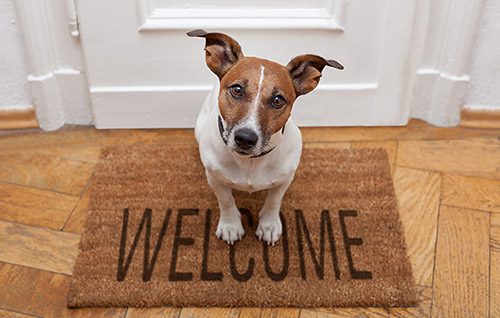
We’ve helped many families that have shared concerns that their dogs could thwart the home study process. If a home study is actually denied, this is very serious, and the fee for Lifetime is nonrefundable. This is why in Lifetime’s application we’ve asked specific pre-screening questions so that we can alert a family in advance in case we see a concern that they would not be able to pass a home study.
What Causes a Home Study to Be Denied?
Being denied a home study in private adoption is not common. In some states, a social worker cannot simply deny a home study but must go before a board to make a case for why the family should not be allowed to adopt.
Situations where families fail home studies can include things such as:
- Felony or child-related crime
- A spouse not fully on board
- Unclean living environment
- Pets not being adequately licensed and vaccinated according to local requirements
- Lack of adequate electricity and running water
- History of mental illness for which a person was hospitalized
- History of substance addiction/abuse without a clear demonstration of a healthy pattern long term (with substance issues, the family would need to have a plan in place in case of relapse)
You can see that failing a home study is usually for very serious things. A rambunctious pair of dogs shouldn’t hinder you. However, I would definitely have concerns if the dogs exhibit aggressive behavior, such as snapping or growling, and cannot be subdued. A home study provider is required to meet all pets.
Having dogs shouldn’t pose a problem for your home study so long as they’ve been vaccinated and are well-socialized. Depending on the adoption laws in your state, you may be required to include a certificate of vaccination with your home study paperwork.
We’ve actually never seen a family not pass a home study due to pet behavior, and are happy to share some ideas with you!
Dog Training and Socialization
In the days leading up to the scheduled home visit, it is helpful to begin desensitizing the dogs to visitors by having new guests over. Train your dogs to remain calm while the guests enter the home and greet them. Some dogs feel safer in their crate until it’s time for the meet and greet.
You can train your dogs on something called “place” and “target” which will allow your dog to observe as you answer the door, and then your guest will offer the dogs a treat. During the training, you only reward the dogs if they remain calm.
One of our staff here at Lifetime recently joked, “We had a dog that we nicknamed The Hulk, due to his split personality around certain strangers. We had him assessed by a dog psychotherapist (yes, she exists), and were able to train him on Place and Target, so we could have people over. It was successful!”
The Home Study Process
Home studies usually take about six to eight weeks to complete, and it is customary for adoptive parents to work on the home study while creating the presentation materials with Lifetime. Most families do things this way because they don’t want the clock ticking on the home study too soon as annual updates are required.
An experienced home study provider will be professional and objective. She is simply checking to ensure your home meets the state’s minimum requirements for adoption. She is also a great resource in helping parents prepare for adoption on a social level.
Perhaps, when you call to consider a home study provider, just ask if they’re comfy with large dogs. If they’re not, consider a different provider. However, I can’t imagine a home study provider would let her personal feelings get in the way of approving you.
It’s natural for hopeful adoptive parents with any ounce of self-awareness to think there’s something that could cause them either not to pass a home study or not to be chosen (too old, too young, too this, too that, lives in the country, lives in the city, etc.). The great thing is, Lifetime takes a look at everything as a whole in your application and only offers openings to families we truly feel we can help.
Dogs and Your Adopted Child
The social worker who visits your home will observe your pets and ask how they interact with children. After you bring your baby home, watch your pets closely. Avoid leaving them loose and unattended around your baby. The good news is, most pets adjust well after a baby joins the home.
Your home study social worker may suggest ways to prepare your dogs for the new addition. For example, one couple who adopted through Lifetime bought a lifelike baby doll and held it frequently in the presence of their two dogs. If you want more tips, be sure to check out this blog: “How to Introduce Your Dog to Your Adopted Baby.”
It’s good to consider whether your child may be allergic to your beloved pet. Discuss what you’ll do if this is the case with your social worker. For now, enjoy your animals, and know they should not be a problem.
Founder of Lifetime Adoption, adoptive mom, adoption expert, and Certified Open Adoption Practitioner (C.O.A.P).
Since 1986, adoption expert Mardie Caldwell has been dedicated to bringing couples and birth parents together in order to fulfill their dreams.
“Many years ago, I was also searching for a child to adopt. We didn’t know where or how to get started. Through research, determination, and a prayer, our dream of a family became reality. I started with a plan, a notebook, assistance from a caring adoption consultant and a lot of hard work; this was my family I was building. We had a few heartaches along the way, but the pain of not having children was worse!
Within weeks we had three different birth mothers choose us. We were overwhelmed and delighted. Many unsettling events would take place before our adoption would be finalized, many months later. Little did I know that God was training and aligning me for the adoption work I now do today. It is my goal to share with our families the methods and plans which succeed and do not succeed. I believe adoption should be affordable and can be a wonderful “pregnancy” for the adoptive couple.
I have also been on both sides of infertility with the loss of seven pregnancies and then conceiving by new technology, giving birth to a healthy daughter. I have experienced first-hand the emotional pain of infertility and believe my experience allows me to serve your needs better.
It is my hope that for you, the prospective parents, your desire for a child will be fulfilled soon.”




0 Comments